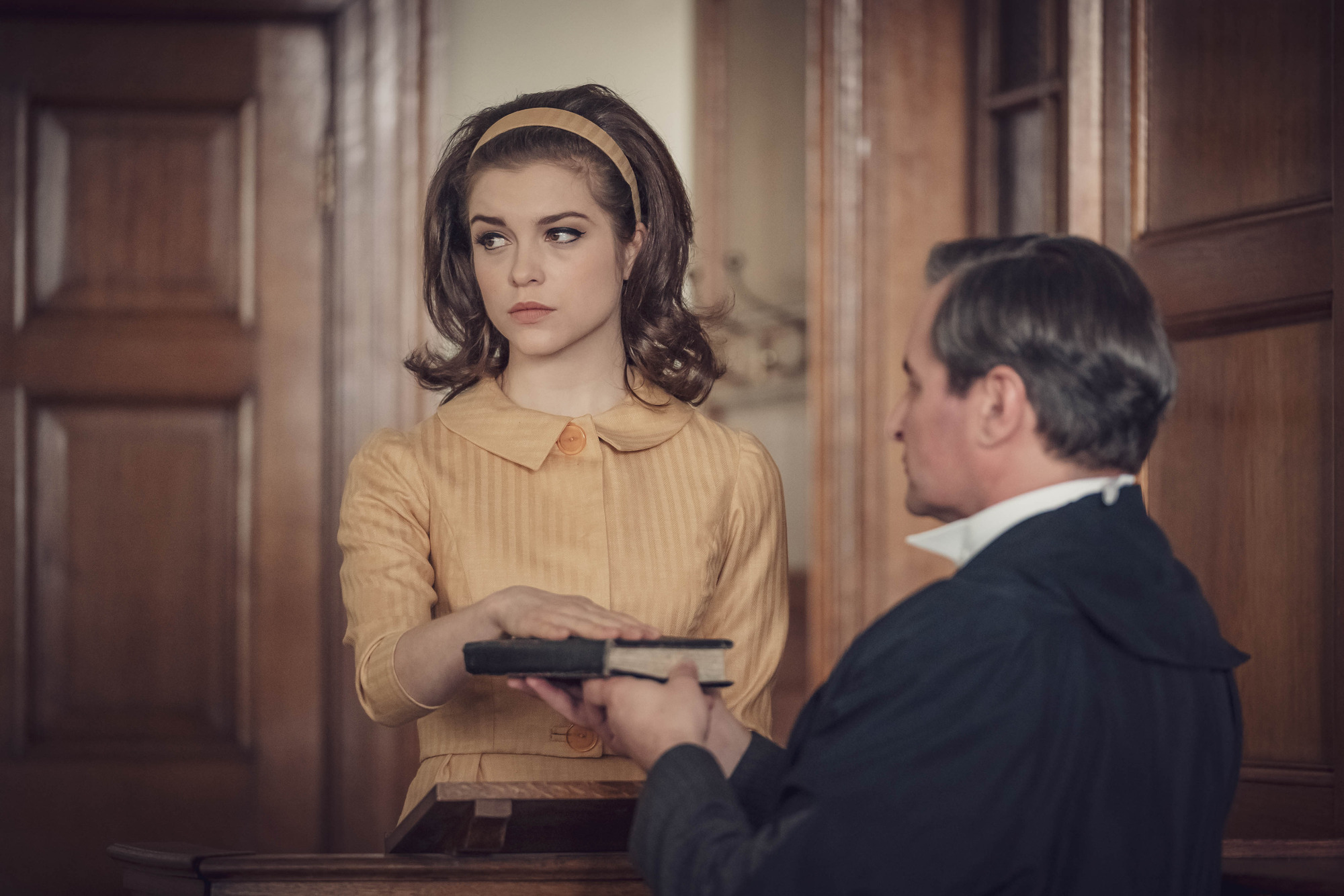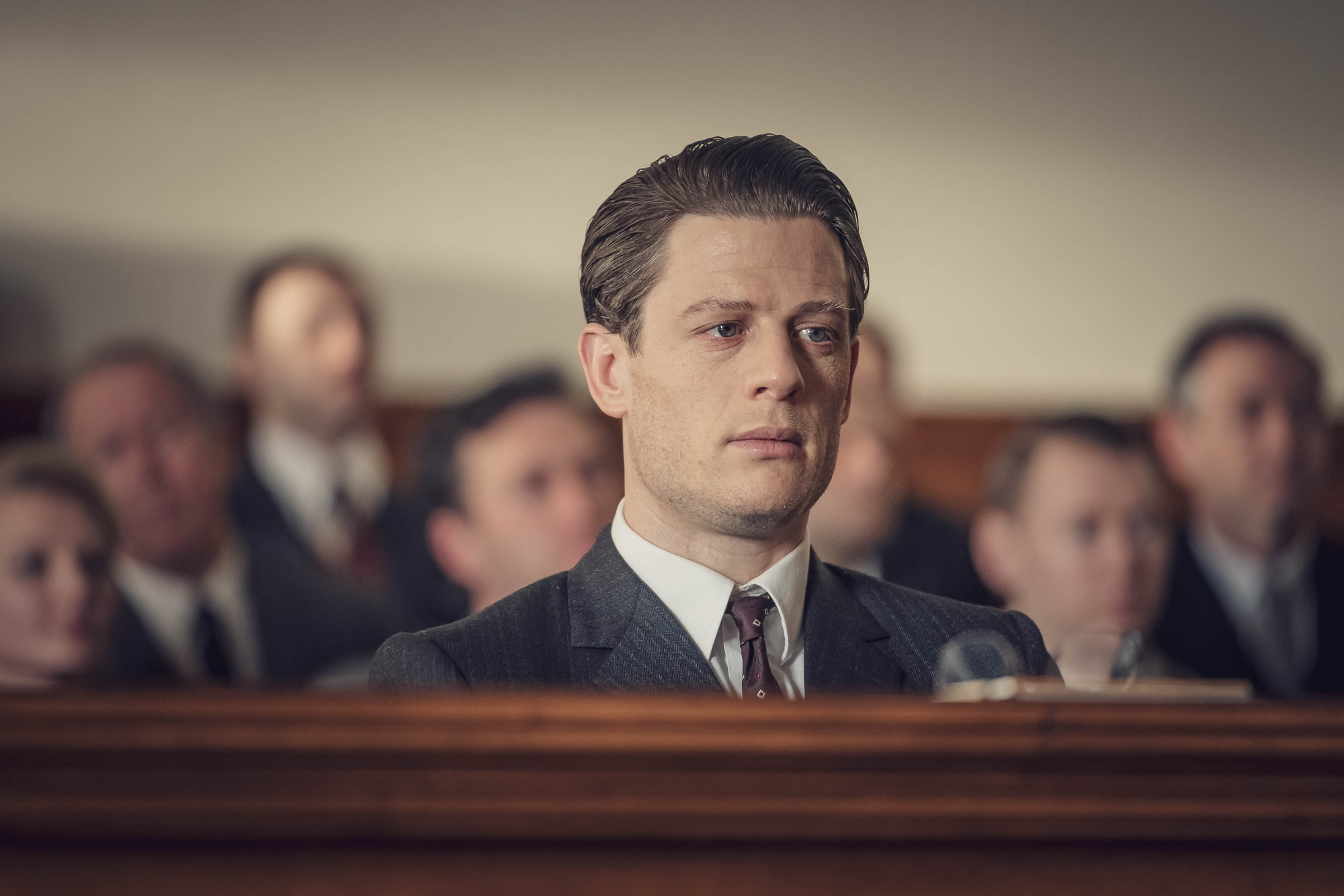Warning: this article contains spoilers for episode two of The Trial Of Christine Keeler. Read on at your own peril…
What makes the world go round? According to Stephen Ward (James Norton) in the latest episode of The Trial of Christine Keeler, it’s power: “Those who have it will fight tooth and claw to hold onto it.”
This week’s episode – the penultimate of the series – focuses almost entirely on Stephen’s trial, where he’s accused of living wholly or partly off immoral earnings. Christine (Sophie Cookson) and Mandy Rice-Davies (Ellie Bamber) unwillingly helped the police build the case against Stephen in episode four, and now everything will be tried in court.
Meanwhile, John Profumo (Ben Miles), having resigned from his government position at the end of last week’s episode, is now dealing with the fallout of his actions, while other prominent figures are seeking to distance themselves from Stephen.
Here, Stylist contributor Sarah Shaffi breaks down what happened in episode five of The Trial of Christine Keeler.
What are the consequences for Profumo after the affair?
To be honest, Profumo is having the easiest time of all the characters on the show, and it’s no surprise given that he’s a wealthy, white man.
The press are still camped outside his house, but most of the press coverage is focused on Christine rather than on trying him. Inside his house, things are a little frosty; Profumo’s wife Valerie (Emilia Fox) has discovered via Christine’s story in the News of the World that Profumo gifted her the same perfume he’s previouslygiven Valerie.
But even though he’s given up his government job and his wife is acting cold, Profumo is living pretty: Valerie is still publicly standing by him, and he’s used his power to make sure he won’t be called to testify in Stephen’s trial.
What do Christine and Mandy say in Stephen’s trial?
Both Christine and Mandy testify for the prosecution, although neither wants to. In a meeting the night before the trial starts, Stephen tells Christine to tell the truth, which she does, although perhaps a little too honestly. At one point, she admits that she sometimes used to give Stephen money, but Stephen’s defence turns this into a positive, saying that Christine used to pay for the phone and some groceries, but never owed Stephen any money.
Mandy is confident during her testimony, deftly answering the prosecution’s assertions that her relationship with Peter Rachmann was prostitution. “Peter Rachmann kept me, your honour,” says Mandy. “We lived together. I thought he wanted to marry me. It’s every woman’s dream, isn’t it? Being looked after by your husband. I don’t know if that counts as paying for sex.”
She says she slept with a number of men while living with Stephen, including Lord Astor. When told Lord Astor has denied sleeping with her, Mandy replies: “Well, he would, wouldn’t he?” The quote makes the front pages the next day.
What does Christine and Mandy’s treatment in court say about the way women are viewed?
Although the trial is about Stephen, it seems as though Mandy and Christine are the ones being accused of something. The prosecution seems determined to paint them as prostitutes simply because they enjoy sex, and because both have had a number of sexual partners. Even Stephen’s defence isn’t innocent in this, at one point he tells Christine that if she wanted to be a prostitute, she’s pretty enough to have made money at the job.
The judge in the trial is also cruel to Christine in particular, and it’s clear that all the men in positions of authority in the room want to use her sexual past against her.
Add in the fact that people like Profumo and Lord Astor aren’t being called to testify, and we’re looking at a world where women are blamed for having sex and having the gall to enjoy it, while the men they had sex with get away Scott free.
Are there any surprises during Stephen’s trial?
As well as Christine and Mandy, there are a number of other witnesses called by the prosecution, and two of them provide drama during the trial.
The first is Ronna Ricardo (Charlene Boyd) who, like Christine and Mandy, is accused of being a prostitute. She tells the court she and her boyfriend had sex in the same room as Stephen and another woman, but also says that she was never paid by Stephen. When the prosecution lawyer asks why she said otherwise, she says the police coerced her by threatening to take her child and her younger sister away from her. It’s a huge moment, and makes Christine and Mandy, as well as Stephen, think that the trial could turn his way.
But the next witness provides another shock, and it’s not a good one. Vickie Barrett (Ella Peel) tells the court Stephen regularly picked her up and drove her to his house, where nameless men had sex with her, and then paid Stephen. Christine and Mandy, in a discussion beforehand, say they never saw Vicki at Stephen’s house, and Stephen himself is so shocked at the allegations that he stands up in court to accuse Vickie of lying, but it’s to no avail.
What effect does Lucky’s appeal have on Stephen’s trial?
In the run-up to Stephen’s trial, Christine finds out that Lucky (Anthony Welsh), who was jailed in the previous episode after being found guilty of assaulting her, is appealing against his sentence. Lucky asserts that Christine lied; we know that she did, and that there were two witnesses to Lucky’s attack on her, and that he didn’t punch her in the face like she said he did.
Christine is worried that it will come out that she lied, and have a negative effect on Stephen’s trial; she thinks people won’t believe her when she says Stephen is innocent because she’s lied about Lucky. She’s right to be worried; just before the jury retires, the news is announced that Lucky’s conviction has been dismissed and he’s been freed, and the judge is damning in his assessment to the jury of why Lucky was freed.
As Stephen leaves court after hearing the news, he knows that Lucky’s freedom means his incarceration.
Where have Stephen’s friends gone?
Among Stephen’s influential friends are politicians, civil servants and members of the landed gentry. But they all seem to abandon him when he needs them most, despite his years of loyalty to them.
At the beginning of the episode, a series of Stephen’s so-called friends and acquaintances gather in the Athenaeum Club, where William Rees-Davies (Paul Ryan), a Conservative minister and barrister, asks them to consider whether or not they will act as characters witnesses for Stephen. Michael Eddowes (Anton Lesser), who we saw early in the series being introduced to Christine, suggests they wait and see what one of Stephen’s oldest friends, Lord Astor, does.
Unfortunately for Stephen, Lord Astor has already left the country so he won’t be called to testify as a character witness for Stephen.
Upon hearing the news, the men in the Athenaeum Club literally abandon ship, seeing no reason to speak up for Stephen if a man more powerful than them refuses to do so.
How does the trial and being abandoned by his friends affect Stephen?
Stephen has become increasingly depressed as he’s become increasingly isolated. None of the “friends” he spent years being loyal to will stand up for him, even though he’s innocent. He’s also not really allowed to see Christine and Mandy because of the trial. A sociable person, Stephen finds that, plus hearing lies about himself in court, difficult to handle.
In the final scene of this episode, he writes a letter which he says that he’s found the horror “in court and on the street” unbearable. “It is not only fear, it is a wish not to let them get me,” he writes. “I’d rather get myself.”
As the episode ends, Stephen, having taken a number of pills, falls into unconsciousness.
Images: BBC/Ecosse Films
Source: Read Full Article

